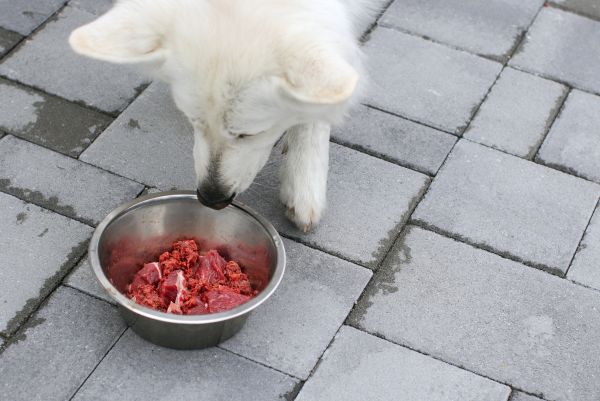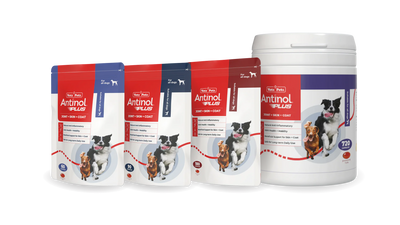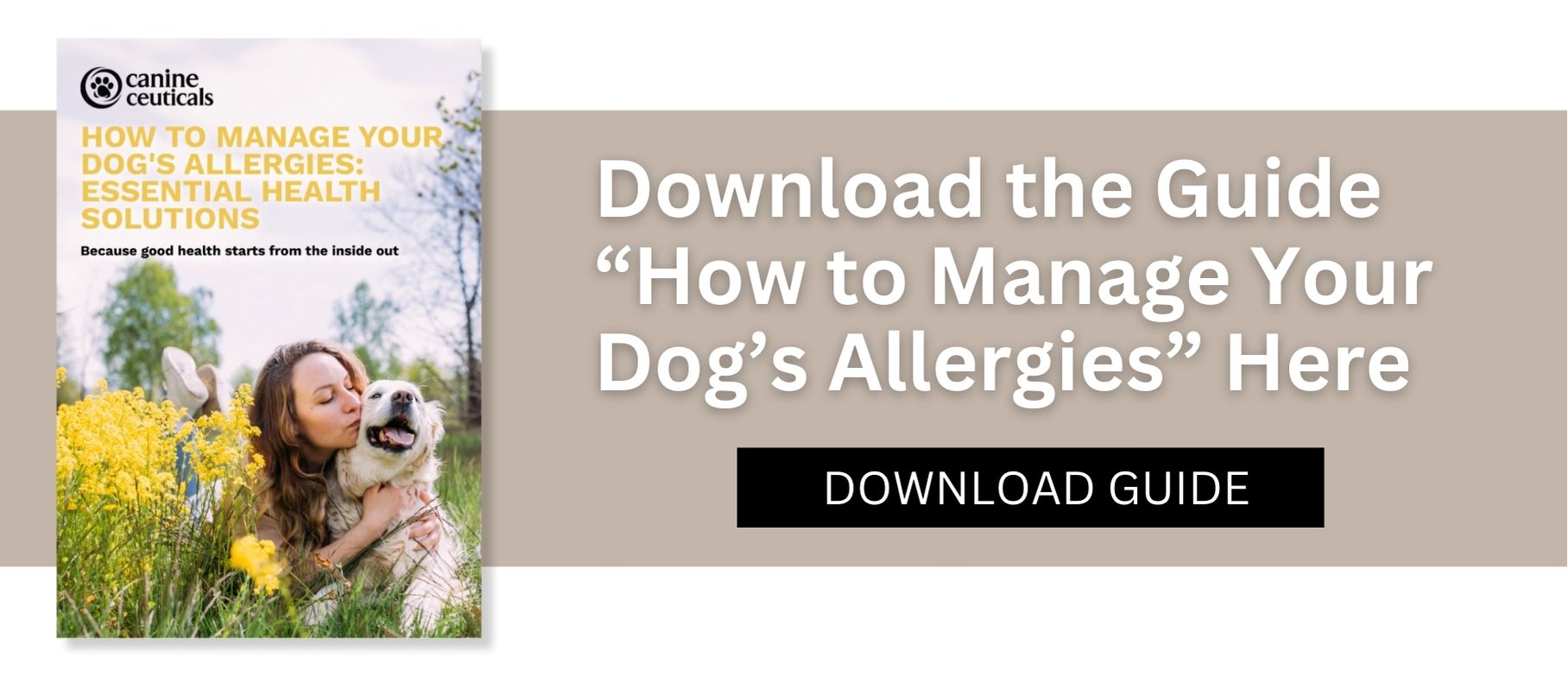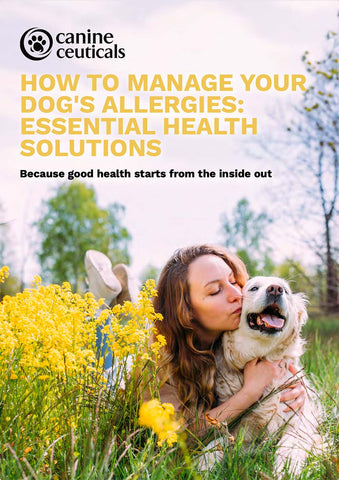With the approach of spring, many pet parents feel a creeping dread as our canine companions' seasonal allergies start to flare-up. Just like humans, dogs can suffer from environmental allergens during this shifting of seasons, causing a considerable amount of discomfort and distress.
But with the right approach and proactive measures, you can alleviate your dog's seasonal allergy symptoms and provide them with much-needed relief. It's not just about dealing with symptoms as they arise, but also about pre-emptive care and creating an environment that minimises the risk of allergic reactions in the first place.
Understanding Seasonal Allergies in Dogs
Before diving into proactive measures and treatments, it's vital to first understand exactly how allergies manifest in dogs. Again, similar to humans, allergies in dogs involve the release of histamine, a chemical produced by the body's immune system when exposed to allergens. This is the very reason why allergy medicines are known as ‘antihistamines’, as they act to suppress the release of histamine in the body to prevent or suppress an allergic reaction.
Also known as atopic dermatitis, environmental allergies rank among the most prevalent skin diseases in dogs, and are most often caused by:
- Pollen
- Grass
- Weeds
- Mould spores
- Dust mites, and
- Leaf mould
These can trigger a range of different reactions in dogs, including:
- Paw licking
- Incessant scratching
- Watery eyes
- Runny nose
- Sneezing
- Coughing
- Chewing
- Skin damage (from scratching, biting and licking), often leading to infections
- Hair loss
- Ear infections, and
- Gastric issues
Of all dogs, 20 to 30% have some type of allergic dermatitis. Dogs can come into contact with environmental allergens either through inhalation (via the mouth or nose) or direct contact (via the skin).
A range of treatment options exists for managing these environmental allergies, from antihistamines that reduce allergic reactions to specialised shampoos that soothe irritated skin. In more severe cases, immunotherapy might be recommended to help the dog's immune system become less reactive to the allergens over time.

Preventive Measures For Your Dog’s Seasonal Allergies
Rather than scrambling to retroactively address allergy symptoms as they arise, it's always going to be more effective to take preemptive action against seasonal allergies in your dog to avoid allergy symptoms from developing in the first place.
That’s why we recommend starting to prepare your canine companion’s body at least one to three months before allergy season kicks in.
This proactive approach involves focusing on gut health, immune modulation, omega-3 supplementation, stress reduction, and supporting the detoxifying organs. We’ll expand on each element below.
Why Gut Health Matters
Maintaining a healthy gut is paramount for dogs with seasonal allergies, as an unhealthy gut (i.e. ‘leaky gut’) can exacerbate allergy symptoms by more easily allowing allergens to enter the bloodstream.
To promote a healthy gut environment, we’d recommend taking the following steps:
- Incorporate prebiotics and probiotics into your dog's diet
- Opt for feeding your dog a species-appropriate fresh food diet
- Avoid harsh antibiotics unless absolutely necessary
- Reduce stress, and
- Include antioxidants to combat inflammation

The Importance of Immune Modulation
Rather than resorting to immune-suppressive drugs, which can carry potential risks and long-term consequences for your canine, you may wish to consider natural immune modulation for your dog's allergy management.
Certain prebiotics, probiotics and medicinal mushrooms have been scientifically proven to support immune balance, offering a safer and more sustainable approach to allergy relief.
Harness the Power of Omegas
Omega-3 fatty acids are ideal additions to your canine’s well-being regime, as they possess potent anti-inflammatory properties. This makes them especially invaluable for dogs experiencing allergy symptoms.
These fatty acids not only help to manage allergies but also support overall health, including cognitive function, cardiovascular health, and joint mobility. By incorporating omega-3 supplements into your dog's diet, you can harness the power of nature to combat inflammation and promote well-being.
Stress Reduction For Stronger Immune Systems
Stress can exacerbate allergy symptoms in dogs by compromising gut health and immune function.
To help your canine companion to be more relaxed, you can engage in activities that are specifically designed to reduce stress. For example, you can provide mental stimulation with slow feeders and enrichment toys, spend quiet quality time together, and generally ensure they are receiving everything they need to feel happy and healthy.
In short, creating a comfortable environment can help alleviate stress, improve gut health and bolster your dog's resilience against allergens.
Support Detoxification
The liver and kidneys play crucial roles in detoxifying the body and breaking down histamine. Supporting these organs can aid in allergy management and overall well-being by helping to eliminate toxins, reduce inflammation, and support overall immune function.
Here are ways that supporting detoxification can benefit dogs with seasonal allergies:
- Liver Support: As the primary organ responsible for detoxifying the body and processing allergens, supporting your dog’s liver health is crucial. Consider using herbs such as St Mary’s Thistle (Milk Thistle), Dandelion, and Turmeric, as these can aid in the breakdown and elimination of toxins, including histamines produced in response to allergens.
- Kidney Function: Kidneys help to filter waste products and maintain electrolyte balance in the body. Supporting kidney health with proper hydration, a species-appropriate diet, and supplements such as St Mary’s Thistle, Cordyceps and Reishi mushrooms, can promote efficient toxin removal.
- Reduced Inflammation: Detoxification can help reduce inflammation. By supporting the body's ability to eliminate inflammatory substances, such as free radicals and cytokines, dogs may experience less itching, redness, and discomfort associated with allergic reactions.
- Improved Immune Function: Detoxification supports immune function by removing toxins that can impair immune system activity and compromise overall health. A strong immune system is better equipped to recognise and respond to allergens appropriately, reducing the severity and frequency of allergic reactions.
- Enhanced Skin Health: Seasonal allergies in dogs often manifest as skin irritation, itching, and inflammation. Supporting detoxification can help improve skin health by eliminating toxins that contribute to skin issues.
- Antioxidant Support: Antioxidants play a key role in detoxification by neutralising free radicals and reducing oxidative stress in the body. Including antioxidant-rich foods, such as >brightly coloured fruits and vegetables, and supplements, such as the various super greens, can help protect cells from damage caused by allergens and support overall detoxification processes.
- Gut Health: A healthy gut is essential for detoxification and immune function in dogs. Supporting gut health with probiotics, prebiotics, and fibre-rich foods can promote the growth of beneficial gut bacteria, improve digestion, and enhance toxin elimination through the faeces.
- Environmental Toxin Removal: Dogs are frequently exposed to environmental toxins, such as pesticides, pollutants, and household chemicals, and these can likewise exacerbate seasonal allergies. Supporting detoxification can help remove these toxins from the body and reduce their impact on allergic reactions.
By supporting detoxification through various dietary, lifestyle, and supplementation strategies, you can help alleviate your dog’s symptoms of seasonal allergies and improve their overall well-being.

Manage and Prevent Yeast Flare-Ups
Yeast flare-ups are common during allergy season, adding to your dog's discomfort. Preventing and managing yeast flare-ups requires a multifaceted approach that targets both the underlying causes and provides relief from symptoms.
Here are some steps we would recommend, to help manage and prevent yeast infections in your canine companion:
- Dietary Adjustments: Yeast thrive on simple sugars from carbohydrates, so you may want to consider transitioning your dog to a low-carb, low-sugar diet to minimise the risk of yeast taking hold. Prioritise feeding a balanced BARF-style diet that includes high-quality proteins, healthy fats, and limited carbohydrates (i.e. avoid or minimise grains and legumes).
- Probiotics and Digestive Enzymes: Probiotics can help by introducing beneficial bacteria into the gut, which work to crowd out harmful yeast and maintain a healthy balance of flora. Meanwhile, digestive enzymes aid in the breakdown and absorption of nutrients, helping to promote healthy digestion, whilst also working to break down yeast cell walls and inhibit biofilm formation. (We recommend Gut Protect)
- Try Topical Treatments: For localised yeast infections, such as those affecting the skin or ears, antifungal shampoos, sprays, wipes, and ear cleansers can help reduce yeast proliferation and alleviate symptoms. Consult your veterinarian for guidance on the best options for your dog.
- Regular Hygiene Practices: Keeping on top of your dog’s hygiene can help to prevent recurring yeast infections. Incorporate it into your dog’s grooming routine to regularly clean their ears, paws, and skin folds with gentle, pet-safe cleansers to remove excess moisture, debris, and yeast.
- Address Underlying Health Issues: Allergies, gastrointestinal disorders, hormonal imbalances, and immune system disorders, can all mean your dog will be more prone to developing a yeast infection. In this case, we would suggest consulting with a trusted veterinarian to address any underlying health issues that may contribute to yeast flare-ups.
- Manage Environmental Factors: Try to minimise your dog’s exposure to damp or humid conditions as these are likely to exacerbate yeast infections. Likewise, ensure your home is well-ventilated, particularly in areas where moisture may build up, and consider investing in a dehumidifier.
Embracing Natural Remedies
Rather than relying solely on conventional medications, you may wish to explore natural remedies like those in the CanineCeuticals Allergy Support Bundle, which combines the three key products each targeting a different internal mechanism that contributes to the development of allergies in our dogs, providing relief from inflammation, redness, pain and itch.
By taking a proactive approach and addressing the root causes of allergies, you can help your canine companion enjoy a happier, itch-free springtime.
In Conclusion
We hope the above information has helped with dog seasonal allergies treatment ideas and outlined proactive measures you can take before allergy symptoms begin to manifest. With proper care, attention, and a holistic approach to allergy management, you can support your dog's health and well-being throughout the changing seasons.
Want to learn more about How to Manage Your Dog’s Allergies? Then download our Essential Health Solutions Guide here.
Prefer to learn by listening? Then check out Narelle's podcast episode From allergies to pain – why your dog needs P.E.A here.






